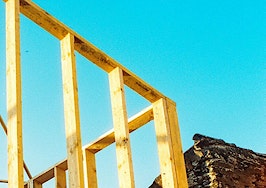- BuildZoom study shows all major cities decreased densification from 1980 to 2010 compared to 1950 to 1980.
- In Las Vegas, where densification dropped the least (down 16.6 percent) and expansion skyrocket by 230.7 percent, real home prices went up just 4.7 percent.
- Expensive cities are showing less sprawl and less densification, yet the economy and demand remained strong.
- Redevelopment could sustain increasing demand while avoiding urban sprawl.
As population swells, so does the need for housing. A new study from BuildZoom reviews how cities have historically dealt with newcomers, particularly where expansion is skyrocketing to increase housing supply.
“The popularity of dense urban living hit rock bottom in the 1970s and has been growing noticeably since the late 1980s,” explained Issi Romem, chief economist at BuildZoom and author of the densification report.
“As a result, dense urban cores have seen much greater price increases over the years than the same metro areas’ outlying suburbs.”

Nevertheless, all cities surveyed show a drop in densification from 1980 to 2010 compared to 1950 to 1980.
Some cities used urban sprawl and expansion to accommodate growing demand in the last 30 years or so, the report says, while others have omitted both routes and failed to produce enough housing, which diminished affordability through boom and bust housing demand cycles.
Romem says there are three categories of cities.
Legacy cities are those that once had strong demand and overbuilt to compensate, softening current housing prices.
Then, there are expensive cities where sprawl slowed and prices rose.
Finally, numerous cities expanded to accommodate demand and keep prices from rising steeply.
No matter the category, densification has slowed across the board, the data show.

In Las Vegas, where densification dropped the least (down 16.6 percent) and expansion skyrocketed by 230.7 percentage points, real home prices are up just 4.7 percentage points.
Expansive cities like Austin, Houston and San Antonio show drops in real home prices over the last few decades.
In Houston, densification dropped by 43.5 percentage points between the rates of 1950 to 1980 and 1980 to 2010. Expansion, however, increased 104.2 percentage points from 1980-2010, and change in real home values during this period fell 15.5 percentage points.
Washington D.C. — also an expansive city — lies just marginally on the side of positive housing production and expansion, still exhibiting a boost in real home prices. Densification in D.C. dropped 56.1 percentage points when comparing rates from 1950 to 1980 and 1980 to 2010. However, in the latter 30 years, expansion increased 76.2 percentage points and real home prices rose 99.6 percentage points.
Meanwhile, cities like San Francisco, Los Angeles and New York City saw less housing production and expansion, but a serious boost in real home prices from the 80s onward.
Densification in San Francisco dropped 58.9 percentage points when comparing rates from 1950 to 1980 and 1980 to 2010, while expansion boosted just 30.1 percentage points. Home prices in San Francisco after 1980 went up 188.1 percentage points, in real terms.
L.A. and NYC are similar to the City by the Bay in terms of housing production, according to the report.
Densification in L.A. dropped 61.8 percentage points when comparing the two, 30-year terms, while expansion increased less than 40 percent in the same time. In NYC, densification dropped 76.1 percentage points from 1980 to 2010, while expansion rose only 32.5 percentage points.
The result? Real home prices in L.A. and NYC jumped 129.5 and 146.9 percentage points, respectively.
Like every other city, Chicago saw a drop in densification, but a less prominent increase in real home prices. Densification dropped 67.8 percentage points and expansion boosted over 50 percentage points from 1980 to 2010, with real home values increasing a more moderate 49.5 percentage points.
Miami’s densification dropped almost 50 percentage points, while expansion went up 71.2 percentage points and real home prices rose 74.9 percentage points.
The densification solution
 Expensive cities are showing less urban sprawl and less densification, yet the economy and demand remains strong, which Romem explains results in high-priced housing. Affordability problems for young people trying to purchase homes is only going to get worse in those areas, the report shows.
Expensive cities are showing less urban sprawl and less densification, yet the economy and demand remains strong, which Romem explains results in high-priced housing. Affordability problems for young people trying to purchase homes is only going to get worse in those areas, the report shows.
While many residents may value urbanism, densifying is difficult. Outward expansion into low density land — less than four homes per acre — seems to be the easier solution. In some locales, zoning and construction approval is complex for both expansion and densification.
“Adding enough housing within the developed footprint to contain housing price growth is not impossible, but under the current circumstances, it would entail a steep uphill battle,” he said.
Romem says redevelopment could sustain increasing demand while maintaining affordability and the cultural, social integrity of urban living.
“The way to change that is to do things that haven’t been done in this country yet, like allowing apartments to replace single-family homes,” he said. “If densification were a body, that would be the heart.”











